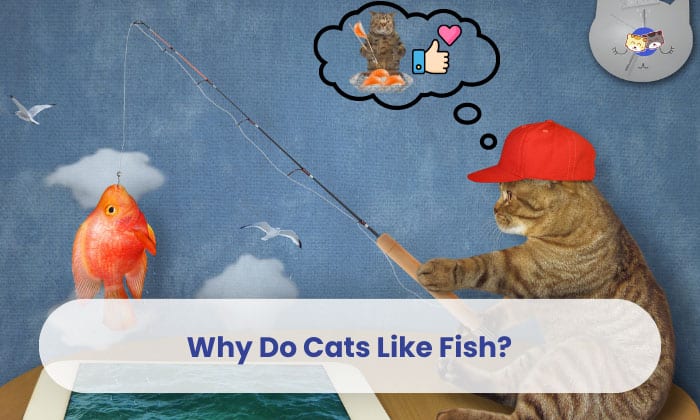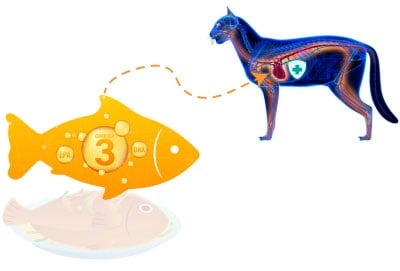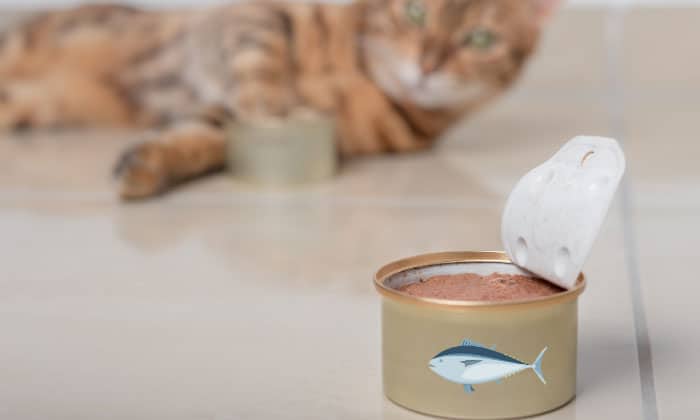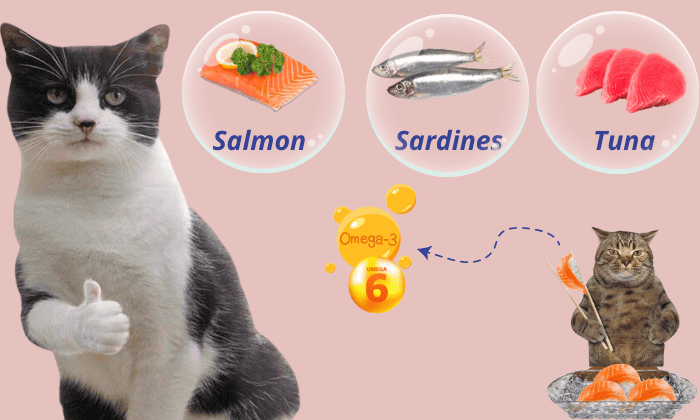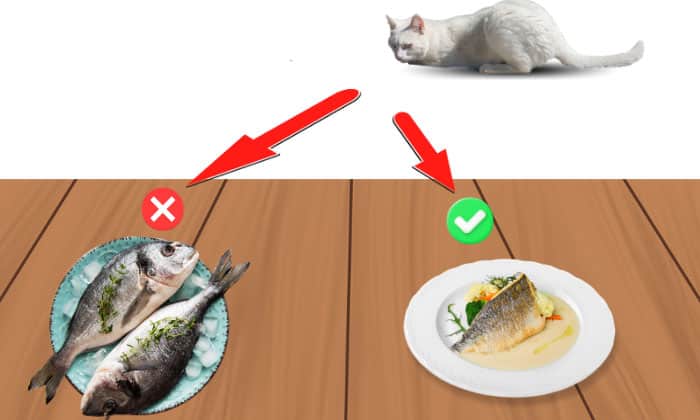There is no denying that fish is one of the cats’ favorite foods. You may even notice your furry pet sneaking for a bite if you have a fish dish in the kitchen.
But have you ever wondered, “Why do cats like fish?”
Cats like fish because they are attracted to its strong seafood smell. It also contains loads of protein and nutrients.
Felines detect these nutrients using their taste buds, letting them know that fish provides them with the health benefits they need.
Table of Contents
- Why Cats Like Fish According to History
- The Benefits of Feeding Fish to Cats
- Do All Cats Like Fish?
- Is It Okay to Feed Cats With Fish-flavored Food?
- Can Cats Eat Fish Bones?
- Best Fish to Feed Cats
- Tips for Fish Preparation and Precautions
- What Happens if My Cat’s Diet Be All Fish?
- How to Know if a Cat is Allergic to Fish?
- Frequently Asked Questions
- Conclusion
Why Cats Like Fish According to History
It is believed that the African wildcats are the descendants of domestic cats. These felines are carnivorous hunters, so they are acquainted with the taste of meat, like rabbits, rats, reptiles, and birds.
The feline descendants lived in the desert, where there were many land animals but not water and fish. Although unable to prove with concrete evidence, historians believe Egyptians introduced fish to felines about 5,000 years ago.
The early Egyptian civilization made a living through farming. However, rodents kept pestering their crops, so they looked for ways to eliminate them. As cats were the natural predators of rodents, the Egyptians put the felines into their farms using fish they caught from the Nile.
From there, the Egyptians domesticated wild cats to use them to protect their crops against pests. Not long after, wild cats became useful pets for Egyptian farmers.
The Benefits of Feeding Fish to Cats
Cats love fish, but are there benefits to feeding your pet with this seafood?
1. Protects The Heart
The oil that fish contains, such as omega-3 fatty acids, strengthens the heart of felines. It reduces your furry friend’s susceptibility to irregular heartbeat.
If your pet is suffering from some form of heart disease, fish oil can prevent their blood from clotting and clogging their veins.
2. Slows Down Kidney Diseases
Fish, especially tuna and salmon, decreases blood pressure. If a cat has kidney disease, the decreased blood pressure reduces the production of inflammatory substances, preventing your pet’s kidney condition from worsening.
According to research, felines with kidney disease who were given DHA-enriched fish oils showed lower creatinine levels in their urine test.
3. Helps Cats With Skin Allergies
Cats like fish so much, so you must take advantage of this fact if your pet has skin allergies. Feeding your cat with fish can help reduce itching caused by allergies.
Such is possible as fish contains anti-inflammatory properties that can help to soothe itchy and inflamed skin caused by cytokines. In return, your feline friend’s skin improves significantly.
4. Improves Cognitive And Neurologic Functions
It has been observed that the nutrients in fish can help maintain cognitive and neurological health. The reason is that fish oil improves neurologic development, thus improving brain function. As a result, cats can better retain taught skills and improve their learning ability.
5. Prevents Joint Inflammation
Older felines are susceptible to arthritis, a condition that inflames their joints due to excessive production of prostaglandins.
On the other hand, fish oil reduces a cat’s body’s production of prostaglandins. The fewer prostaglandins there are, the less inflamed your pet’s joints will be.
Do All Cats Like Fish?
Cats like seafood, especially fish. But while many felines like either cooked or raw fish, it is important to note that it is not a general feline preference.
Like humans, cats have different tastes and preferences. So, while your pet may have a solid affinity for the smell and taste of fish, others may not even show a slight interest in it.
Apart from knowing whether your feline friend likes fish or not, another thing worth noting is whether you are providing it with a balanced diet. So, if your pet likes fish, it’s not enough that you feed it just this food alone.
The reason is that while fish is highly nutritious, it may not provide all the nutrients your pet needs. A diet composed of fish alone can result in nutritional imbalance.
Moreover, there are some cats allergic to fish. The reason is that fish contains histamine, a protein that can cause sensitivity and allergic reactions. In addition, there’s a chance the fish contain additives or preservatives that are allergens to cats.
If you feed your pet fish and it experiences vomiting, sneezing, wheezing, diarrhea, or swollen skin, it’s likely that the cat is allergic.
Is It Okay to Feed Cats With Fish-flavored Food?
Let’s say your pet cat likes fish, but you don’t want to feed it with a fish diet alone. In this case, you might think of adding fish sauce to its food to mimic the smell of real fish.
However, it is crucial to note that artificial flavors have no place on your feline’s friend’s diet. Artificial ingredients can put your pet’s health at risk, as they can trigger digestive issues, allergies, and even kidney diseases.
Artificially-flavored foods are also often high in calories. So, even if they don’t trigger your pet’s allergies, they can lead to obesity in the long run. Not to mention that there’s a risk that your cat will eventually develop an allergic reaction to the ingredients involved in making these artificial foods.
Can Cats Eat Fish Bones?
Despite the nutritional benefits fish source provide to cats, the only part they should eat is the meat. You should never feed your furry friend with fish bones, as they can get lodged in its mouth and digestive tract.
A fish bone stuck in your pet’s mouth and digestive organs is painful. Even worse, it can result in internal damage and an expensive visit to the vet.
Best Fish to Feed Cats
Cats like salmon and sardines, which are rich in healthy fats like Omega-3 and 6. So, feeding it to your cat can provide it with loads of health benefits.
Additionally, cats like tuna, but it can be addictive to them. You can give your feline friend some tuna but never on a regular basis.
Once your pet gets addicted to the taste of tuna, it will prefer it more than other meats and refuse to eat other food.
Tips for Fish Preparation and Precautions
Feeding your cat raw fish is not recommended as it can contain bacteria and parasites, which can poison it. Instead, cook fish for cats thoroughly without adding seasoning to it. You can grill, bake, or boil the fish as preparation. Do not fry the fish, as it may add unnecessary fat.
After cooking, let the fish cool and remove all its bones before giving it to your cat.
Another thing worth noting is that a large part of your cat’s diet should contain other meats and not fish alone. It doesn’t matter if your pet likes fish more than chicken; you must train it to eat a balanced and healthy diet. If anything, fish should be used as a treat or supplement only, so feed it in moderation.
After feeding cats fish, keep an eye on your cat to monitor the feline’s reaction to see if there are any signs of allergy or digestive upset.
What Happens if My Cat’s Diet Be All Fish?
High levels of thiaminase can be found in seafood like fish. This enzyme can destroy the body’s vitamin B1, thus causing vitamin B1 deficiency. As a result, the cat may suffer from seizures and neurological problems.
Apart from this fact, fish is also low in calcium. So, if you feed your pet with fish alone, it will suffer from calcium deficiency and weak bones.
How to Know if a Cat is Allergic to Fish?
While fish is a healthy and delicious source of protein for cats, some felines can be allergic to seafood. Unfortunately, you can only know that your feline friend is allergic to fish once it has already ingested some.
If it is your first time giving fish to your pet, make sure only to feed it with a small portion. Then, observe if it will experience any of these symptoms:
- Itchiness starting on the head and neck
- Licking and scratching
- Rashes
- Hair loss
- Hives
- Swollen face and limbs
- Inflamed paws
Should any of these symptoms occur, bring your pet to a veterinarian for diagnosis.
Frequently Asked Questions
Is it true that cats like fish and milk?
If you’ve seen animated films that involve cats, you will see them eating fish and drinking milk every time. But while it is a fact that cats like fish, the conception that these furry animals like milk is no more than a myth.
In fact, all adult cats are lactose intolerant, so you should never give them milk. Even kittens cannot tolerate milk unless it comes from their mother.
Why do cats like the smell of fish?
Cats like the smell of fish because it has an intense meaty odor. Since cats are carnivores, they can quickly recognize the smell of any meat, so they go crazy when you are cooking fish in your kitchen.
Why does my cat smell like fish?
The most common reason why a cat may smell like fish is urinary tract infections (UTIs). A feline’s urine resembles the pungent odor of ammonia when their urinary tract has problems.
Conclusion
Why do cats like fish? The most common answer to this question is that they are carnivores. They also have sensitive glands that make them go crazy even at the slightest smell of fish.
And while fish contains loads of protein, the most common reason cats love it is because it tastes so good. Felines have delicate taste buds, so they enjoy the bursting flavors they can get from eating fish.
That said, if you are looking for fish for kittens, the types of fish written above are good kinds to start with.

I am Amy Sawy, a Doctor of Veterinary Medicine (DVM) graduate from the University of Kansas. y husband, Dr. Plummer, and I own a veterinary clinic in Phillipsburg, Kansas. In addition to my professional background, I am a devoted pet owner myself, with a household that includes dogs, rodents, and most notably, cats – a total of five felines in my home.
In 2020, I joined an organization as a professional writer, leveraging my experience and collaborating with my team to deliver the most valuable information for your cat’s care.


